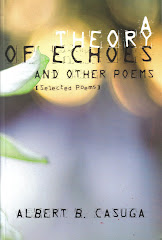09 March 2009
Example of Multilingual Criticism?
I don't have enough money to subscribe to online journals (not to mention that I am an advocate of Open Access), so I have read only the abstract and not the full article of "Bilingual creativity in Chinese English: Ha Jin's In the Pond" (2003) by Hang Zhang.
This is the abstract: "This paper addresses issues related to bilingual creativity in Chinese English and their implications for world Englishes in the Chinese context. The language examined in this paper is drawn from Ha Jin's novella, In the Pond, in which the author's use of English is 'nativized' to the Chinese context in order to recast the cultural meanings of the language. Rooted in social realism, cultural authenticity, and historical accuracy, Ha Jin describes the lives of ordinary people against the larger political backdrop of China. His skilful use of English successfully transcreates his native Chinese experience to form an indigenized narrative style. In this paper, I employ a theoretical framework derived from Kachru (1982, 1986, etc.) to show how Ha Jin's work expresses a distinct Chinese cultural identity. Ha Jin's use of creative innovations in English reflect the texture of Chinese ideological, political and socio–cultural representations. The linguistic exponents of such creativity range from the use of address terms, curse words, to metaphors, proverbs, political expressions, and other aspects of the contemporary Chinese lexicon. Despite a central concern with universal themes in his fiction, Ha Jin simultaneously conveys a distinct sense of 'Chineseness' through the use of nativized discourse patterns, rhetorical strategies, speech acts, and a range of other linguistic devices."
This looks like a promising step from purely linguistic analysis to real literary criticism.
Posted by Isagani R. Cruz at 4:54 AM
09 March, 2009 22:31
Albert B. Casuga said...
Keywords in the abstract are: "indigenized narrative style" and "nativized to the Chinese context."
Assuming that Ha Jin's novella "In the Pond" accomplishes all those literary strategies analised by critic Hang Jiang as palpable in the novella's style and technique, and achieves the "distinct sense of Chinese-ness" (contextual structure), the criticism of his work is, indeed, valid and relevant "literary criticism."
This appears to me as the kind of "literary criticism" Dr. Cruz has been looking for. One does not have to write and speak the Chinese language (or at least a lingua franca) to analise, criticise, and evaluate a Chinese author's work in English.
The de facto "literariness" of the Han Jin's novella qualifies it for a competent literary criticism that guides the reader to its ultimate aesthetic value.
Writers using the second language as a creative medium understand that socio-cultural, ethnic, political, existential underpinings of a fictive or poetic material could be expressed and "objectified" by "nativised" discourse patterns, speech acts, and all types of linguistic devices like the figures of thought, speech, and language. and some such linguistic tools that form part of the energies of the English language as a literary medium.
Of course, misunderstanding "Chinese-ness" is a caveat the critic must be sensitive to. A curse, an address, or even proverbs could easily be misinterpreted so they could become "mnemonic irrelevancies" that would eventually confuse and muddle what would otherwise be a valid analysis, criticism, or evaluation of the work.
When a Chinese fiction character says, "Aiee-yahh", (spelling here creates a speech act) say, would he be expressing disgust, surprise, resignation, disbelief? Would "Ni hao" necessarily mean "Hello", or would include the sarcasm of a "hello?" as an expression of exasperation in urban Detroit, say. Are they enough to establish "Chinese-ness"? Beware, therefore, the errant "nativised" speech act or metaphor.
I just wrote a short story (now published in my Blog Ambit's Gambit http://ambitsgambit.blogspot.com/ which utilises narrative strategies that define the ethnic-ness of the characters in the fiction that revolves around the world of "immigrant senior citizens". Can one appreciate the "Filipino-ness" of the context from the story?--ALBERT B. CASUGA
10 March, 2009 04:34
NYPD breaks up pro-Palestinian protest at Columbia University
-
Police began making dozens of arrests after Columbia University's president
asked for help clearing protesters — citing the "encampment and related
disrupt...
2 hours ago











No comments:
Post a Comment